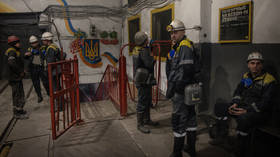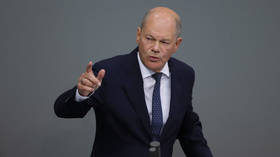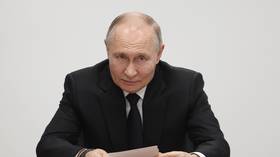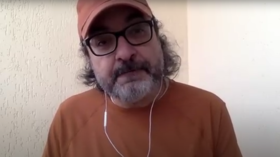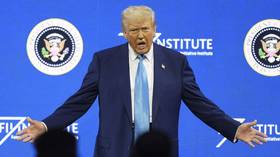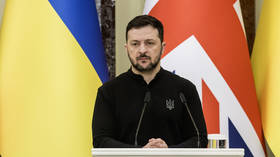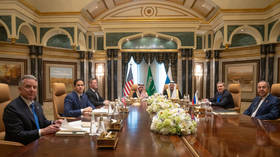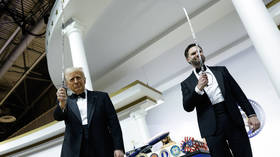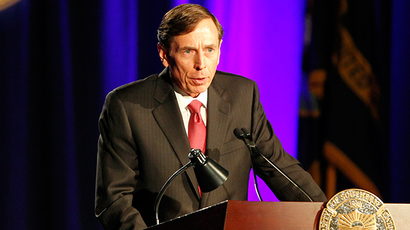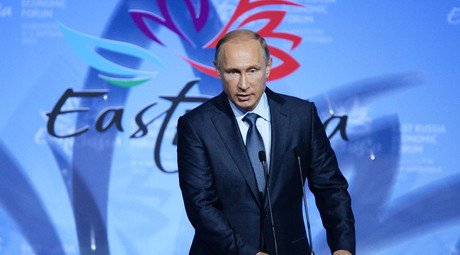Petraeus recipe for battling ISIS: US-protected rebel enclaves in Syria, surge in Iraq
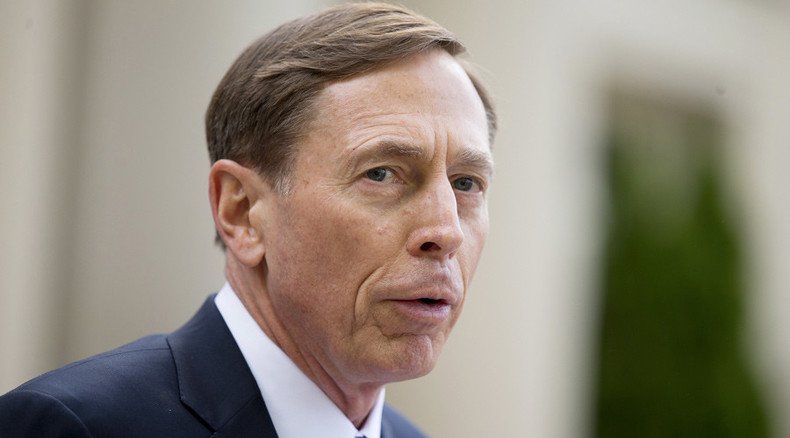
To achieve victory in the Middle East, the US needs to establish and protect rebel enclaves in Syria, and launch another “surge” in Iraq, former CIA director and retired US Army general David Petraeus told a Senate panel.
This was the first public appearance for the retired general and former spymaster, following his April sentencing for revealing classified information to his mistress.
Describing Syria as a “geopolitical Chernobyl… spewing instability” all over the Middle East, Petraeus urged the Senate Armed Services Committee (SASC) to endorse a policy that would “stop the Syrian air force from flying” and establish safe areas where civilians and anti-government rebels could be protected by US airpower and advisers. Meanwhile, all the elements of the surge were once again required in Iraq, but this time around the Iraqis would have to provide the ground troops, he said.
Ret Gen Petraeus tells Senate cmte Syria is a "geo-political Chernobyl" & that "the fallout from the meltdown will be felt for decades."
— Chad Pergram (@ChadPergram) September 22, 2015Petraeus echoed the official position of the State Department that Syrian president Bashar al-Assad was to blame for the rise of Islamic State (IS, also known as ISIS or ISIL), blaming the government’s “barrel bombs” rather than IS for most of the civilian deaths in Syria. The general pushed for the creation of US-backed protected areas where civilians and militia opposed to the government could shelter under the coalition air umbrella. Eventually, he said, US advisers could be deployed there as boots on the ground.
“This is a very complicated military activity, but it is doable,” Petraeus told lawmakers.
Petraeus says he's "not opposed to having some of our forces" in a U.S.-backed 'enclave' in #Syria in an assistance role. @CQnow
— Ryan Lucas (@relucasz) September 22, 2015Petraeus resigned as director of the CIA in November 2012, following the revelations that he had shared classified information with his biographer – and lover – Paula Broadwell. As part of a plea bargain with the government, he was sentenced to two years’ probation and a $100,000 fine.
The ex-general began his testimony with an apology, calling what he did a “serious mistake” and a “violation of the trust placed in me.” The panel, chaired by Arizona Republican John McCain, repeatedly thanked Petraeus for his military service and commended him on the apology.
Without bringing up the Broadwell scandal at all, McCain praised Petraeus as a “distinguished” leader and argued his 2007 testimony was critical to securing Senate support for the 'surge' strategy that “defeated al-Qaeda in Iraq, brought security to the Iraqi people, and created the possibility for meaningful political reconciliation.”
Both Republicans and Democrats on the panel were eager to hear Petraeus’s prescriptions for salvaging the US war effort against Islamic State. A yearlong air campaign by the 60-nation coalition, at the cost of $4 billion, has not dislodged the self-proclaimed Caliphate, while the handful of US-trained Syrian fighters were ambushed and scattered by Al-Nusra Front, an Al-Qaeda affiliate.
.@SenatorShaheen: Should train-and-equip in Syria be abandoned?
#Petraeus: You CAN NOT abandon it, any solution depends on Sunni force.
— Jonas Renz (@JonasRenz) September 22, 2015Petraeus argued that the “train and equip” program was impossible to abandon, since the US strategy in the region absolutely depended on having a Sunni Arab fighting force. Asked whether there was anyone inside Syria actually available to train, he said that many moderate rebels “drifted” to Islamist groups like Al-Nusra, because they had resources and were fighting against the Assad government. Peeling off these low-ranking members could work, he said, just as it did in Iraq.
Petraeus on Syria train and equip program: If we cannot do this, we are not going to defeat the Islamic State.
— Kristina Wong (@kristina_wong) September 22, 2015Arguing that working with the government in Damascus would damage US credibility among the Sunnis, Petraeus called for lawmakers to resist Russian effort to “force” the US into an alliance with president Bashar al-Assad. If Russia really wanted to fight ISIS, it could have joined the US-led coalition and asked to be integrated into the air war, Petraeus said.
Russian president Vladimir Putin recently proposed a coordinated international effort against IS, but rebuffed speculation that Russian forces would engage in combat operations in Syria.
“We are providing Syria with quite strong support in terms of equipment, training of military servicemen and weapons," Putin said. “We are considering various options, but so far what you are talking about is not on the agenda.”
Petraeus did caution against the rush to overthrow Assad, noting that Syria “could actually get worse” if there was no plan for the aftermath.
Petraeus: "We should not be quick to oust #Assad until we have some sense to what will follow him.” #Syria
— Ryan Lucas (@relucasz) September 22, 2015During Petraeus’s testimony before the SASC, it was reported that retired Marine General John Allen, head of the anti-IS coalition, would be stepping down in November. Sources within the Obama administration told Bloomberg that Allen made the decision out of concern for his wife’s poor health.
LISTEN MORE:



